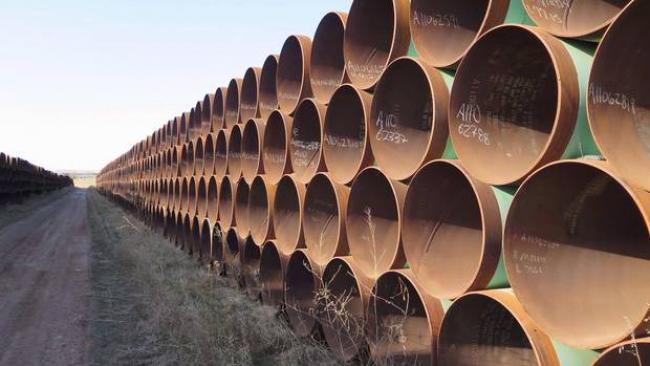Articles Menu

[Webpage editor's comment: Another sign of the unravelling of the tar sands economy]
Inter Pipeline Ltd., whose customers include big oil sands players, has threatened to slap liens on crude oil it transports and is seeking letters of credit from shippers with ratings that have been chopped below investment grade.
Inter Pipeline Ltd., whose customers include big oil sands players, has threatened to slap liens on crude oil it transports and is seeking letters of credit from shippers with ratings that have been chopped below investment grade.
Rival Pembina Pipeline Corp. is hoping to avoid losses by matching new requests to ship crude with producers that bought more capacity than they now need.
Some companies that transport and process oil and gas are going a step further, eyeing possible royalty stakes in producer lands in exchange for building new facilities, people familiar with such negotiations said.
The moves reflect intensifying concern that debt-burdened firms – if they survive at all – could renege on shipping commitments made when oil fetched closer to $100 (U.S.) a barrel. It is an abrupt shock for a segment of the industry long viewed by investors as a safe harbour with little direct exposure to the downturn.
“Nobody has commodity price risk until they do,” said Samir Kayande, analyst at RS Energy Group in Calgary. “When you’ve got an entire value chain that is suddenly less profitable, everyone kind of needs to start taking their cut of the losses.”
To be sure, big export pipelines that carry Alberta crude to the United States are still running full. Enbridge Inc. maintains Western Canada will be short 500,000 barrels a day of export capacity through 2021 as the last wave of oil sands expansions come online.
Pipeline executives have also sought to quell any unease, emphasizing in calls with analysts and investors that such infrastructure is typically underpinned by long-term contracts that compel users to pay regardless of whether they fulfill shipping terms.
Enbridge has said as little as 5 per cent of its business is exposed directly to weak commodity prices, and that roughly 80 per cent of volumes carried on its massive mainline system are tied to shippers with investment-grade credit ratings.
“The message from Enbridge was always: ‘Our shippers are blue chip.’ But the message also is: ‘Our shippers are refiners,’” FirstEnergy Capital Corp. analyst Steven Paget said. “As long as the refiners on the downstream end of Enbridge need oil, they’re going to pay Enbridge.”
Nonetheless, the company is seeking diversification in power generation and natural gas transmission as long-term growth prospects in Alberta’s oil sands fade. It has also sought letters of credit and guarantees from investment-grade parent companies of some shippers as market conditions deteriorated.
Meanwhile, a court ruling this month involving Texas-based Sabine Oil & Gas Corp. has tested the long-held belief that oil-shipping agreements are sacrosanct.
The ruling in New York State said the bankrupt company could use Chapter 11 to shed some of its pipeline contracts, setting a precedent that could potentially expose infrastructure developers to added risks, energy industry lawyers and analysts say.
Inter Pipeline, which operates a patchwork of lines in Alberta, has said it could apply liens on its oil shipper’s crude if they don’t live up to agreements. Its customers include scores of smaller producers as well as bigger oil sands players such as Imperial Oil Ltd., Cenovus Energy Inc. and others.
The move would effectively give it the ability to take ownership of product in the lines, although it is seen as a last resort. “We have not had to exercise this with any of our shippers,” spokeswoman Breanne Feigel said in an e-mail.
More than 90 per cent of the company’s 2015 earnings before interest, taxes, depreciation and amortization were tied to fee-based or cost-of-service contracts, she said.
Still, it has more than 2.3 million barrels a day of capacity available on its oil sands systems following recent expansions. And agreements with new shippers have been hard to come by, chief executive officer Christian Bayle told analysts last month.
“I think that’s true for us and I think that’s true for pretty much every oil sands transportation company today,” he said.
Above photo credit: Alex Panetta